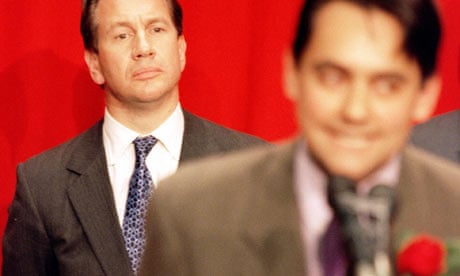Generations of bleary-eyed voters have watched the outcome of successive general elections take shape in the early hours of the morning, often slumped on sofas with a glass of wine or a mug of cocoa in their hand. But next year that ritual looks set to become even more of a marathon.
The BBC is preparing the longest election-night programme in its history, beginning shortly after the polls close at 10pm on a Thursday evening and not ending until the following afternoon, MediaGuardian.co.uk can reveal.
New plans have been drawn up by senior BBC executives because a substantial minority of local councils will not begin counting votes until the morning after the election to save money. That means the election winner, the size of the new government's majority, and the identity of the prime minister, may not be clear until Friday lunchtime.
Some of the most memorable images in recent political history, including Michael Portillo's defeat to Stephen Twigg in Enfield Southgate at the 1997 election, have been broadcast in early hours of the morning. In 2010, many of those seminal moments are likely to take place later on Friday.
The BBC is preparing to market its election coverage as a once-in-a-lifetime TV marathon that it hopes will attract record audiences, with many of the key election-night dramas unfolding in the middle of its Friday daytime schedule.
"If he wins, [Conservative leader David] Cameron won't arrive at Downing Street until 10am, and he won't be on his way to Buckingham Palace until around 2pm," said one of the BBC executive team planning its coverage.
According to the provisional plan, David Dimbleby, who has anchored the corporation's election night programmes since Margaret Thatcher became prime minister in 1979, will be expected to host the show as normal on Thursday evening and through the night, but will also spearhead the Friday daytime coverage.
It is unclear whether Dimbleby, 71, who traditionally endures a sleepless night once every four or five years, will be allowed to get some rest before returning to the studio the morning after the election has taken place.
At least 50 parliamentary seats will not begin counting votes until the Friday morning, according to the Electoral Commission, the independent body that monitors UK elections and reports on them to parliament.
Officials at cash-strapped local councils, who oversee the counts, have privately complained to the commission that they do not have the resources to oversee late-night counts.
They have to pay staff overtime to work through the night. The growing number of postal votes cast also slows down some counts. These have to be checked against the electoral roll before they can be counted.
The commission has written to all 650 constituency returning officers, and has so far received 490 responses, with 53 saying they will conduct Friday counts. A total of 273 said they will do so on Thursday evening, and declare within hours, as normal. A further 154 respondents said they have yet to come to a decision.
In addition, all 10 constituencies in Birmingham, one of the key electoral batttlegrounds with a number of marginal seats, have written to the commission to say they will also count on Friday if the election is held on the same day as next year's local elections on 6 May. That is regarded by most observers as the most likely date for prime minister Gordon Brown to call the general election.
The Electoral Commission has asked councils to tell them about their election night plans by the end of January so that parliamentary candidates and broadcasters can take account of any logistical changes. A spokeswoman for the Commission said: "We do understand that the broadcasters have plans they want to put in place."
The commission spokeswoman added that it had no powers to instruct returning officers on when to conduct their counts. She added that the commission would be updating its figures on how many local authorities will be counting votes on Friday in the next few days. "We can't tell them what to do. We've said the most important thing is the results are accurate. It's entirely appropriate for them to count on a Friday," she said.
It is not clear whether ITV will also extend its election night coverage. Doing so could increase the cost of broadcasting the 2010 poll by hundreds of thousands of pounds.
A BBC spokesman declined to comment.
To contact the MediaGuardian news desk email editor@mediatheguardian.com or phone 020 3353 3857. For all other inquiries please call the main Guardian switchboard on 020 3353 2000.

Comments (…)
Sign in or create your Guardian account to join the discussion